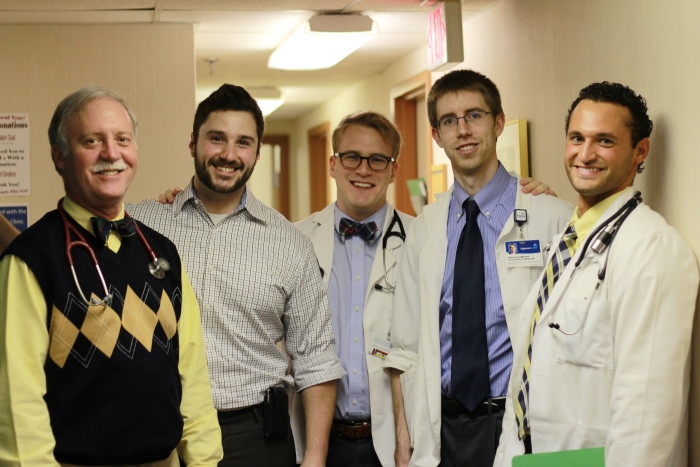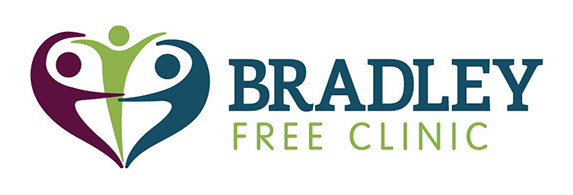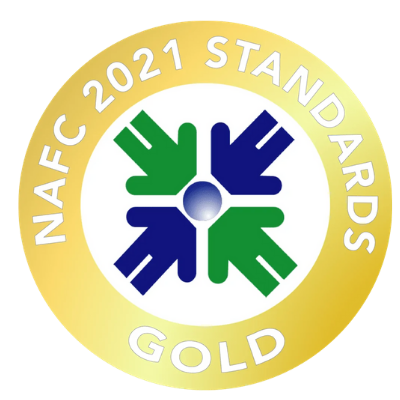Over the years, a lot has changed at Bradley. We’ve grown in size, scope, and vision. But the core of why we exist remains. We believe everyone deserves quality health care. We believe the dynamics of a strong free clinic being and indispensable part of a healthy community. And we are privileged to serve and grateful to all who help us in this mission.
To understand how far we have come, we offer this brief history.
The Free Clinic of the Roanoke Valley opened its doors on October 15, 1974. Dr. Bell served as the first board president and a board of directors comprised of community leaders and visionaries. The clinic’s official mission statement, which has remained unchanged, is as follows: To provide free medical, dental and pharmacy care for low-income, working patients using volunteer health care professionals. It is intended to help those who are making a sincere effort to help themselves and their families. The impact was immediate and profound. The working poor crowded the stairways and overflowed into the yard while waiting their turn to see a doctor. In December of 1974, Estelle Nichols (now Estelle Avner) became the clinic’s first executive director. She would remain at the clinic’s helm for four decades.
Dr. Surrusco helped establish screening criteria, charting and operational procedures at the clinic. Most of all, he took care of patients, embodying the clinic’s legacy of caring. He was soon joined by fellow Drs. Roger Grady, Houston Bell and John “Lucky” Garvin. And the clinic grew; by February, a second night clinic had been added. Dr. Garvin was to play a pivotal role in the growth of the free clinic and became the board’s first president and served for 23 years.
Drs. Victor Skaff and David Black began providing volunteer dental care at the clinic, making it the first free clinic in the country to offer this service. Their “offices” were in a converted mudroom at the Way Inn.
United Way of Roanoke Valley accepted the Free Clinic of the Roanoke Valley as a partner agency. This mutually beneficial relationship continued until the clinic was able to stand on its own. United Way still points to the free clinic as one of its major success stories. Roanoke attorney Heman Marshall joined the clinic board and continues to serve as well as conduct the clinic’s legal affairs without charge. The clinic emerged as the model for its counterparts in other communities and organized the Southeastern United States Conference of Free Clinics.
Guidepost magazine’s Church of the Year Award went to St. Mark’s Lutheran Church for its key role in launching the free clinic. The award was presented by Dr. Norman Vincent Peale, a nationally known inspirational speaker and writer.
All twelve members of the 1984 class of family practice residents at Carilion Roanoke Memorial Hospital became free clinic volunteers. Drs. Randy Rhea & Kevin Kelleher were also in the group. Recognizing their leadership capabilities of both men, Mrs. Avner nominated both for the clinic’s board.
In response to a letter to the White House from Isaac L. Jacobs, a grateful patient, the clinic received a commendation from then-President Ronald Reagan. In his letter to the president, Mr. Jacobs spoke of his admiration for clinic staff and volunteers, and described the peace of mind that he and other low-income patients derived from knowing that the clinic would unfailingly deliver on its promise of free care.
Dr. Kevin Kelleher was named medical director of the clinic, succeeding Dr. Surrusco. Dr. Kelleher remains in office to this day.
Having outgrown the Way Inn, the clinic launched a campaign to find and fund a new home. The campaign raised $1.9 million to set the dream into motion. Among the gifts was $1 million from area philanthropist Marion Bradley Via. At that time, it was the largest individual gift to any free clinic in the U.S.
A building at 1230 Third Street SW, formerly occupied by an orthopedic practice, was selected to be the clinic’s new home. The new clinic opened on February 12 after undergoing some $750,000 in renovations. In 9,000 square feet of space, it contains office areas, four dental facilities, a fully licensed pharmacy, a medical laboratory and nine private examination rooms. Then-First Lady Barbara Bush dedicated the building on April 12 and announced the renaming of the clinic in memory of Harry Lynde Bradley, father of principal donor Marion Bradley Via. The clinic was designated a Presidential Point of Light in the same year.
The August 14 Journal of the American Medical Association published an article by Dr. Kelleher entitled “Free Clinics: A Solution That Can Work Now.” The Virginia General Assembly passed the Liability Protection Act for Virginia Free Clinic Volunteers. With the new state law on the books, free clinics set their sights on the goal of a national liability protection statute.
The Free Clinic Foundation of America was launched from the Bradley Free Clinic. It published A Free Clinic: Starting Out, and a National Directory of Free Clinics which has gone through four editions. After a mention of the startup manual in Parade magazine, the foundation received more than 1,500 requests for copies.
Spurred by testimony from Dr. Kelleher and others, Congress passed the Volunteer Protection Act of 1997, a federal law that protects free clinic volunteers from malpractice actions.
The surgical clinic opened, making BFC one of the few free clinics to offer minor outpatient procedures. It was named for Dr. Young Kang, a retired plastic surgeon. Dr. Randall R. Rhea, a family practitioner in Vinton, was elected president of the free clinic’s board of directors and continues to hold the office. He has remained in office ever since.
The clinic recorded its 200,000th patient visit and reached $50 million in the value of medications and health care delivered since opening.
The Bradley Free Clinic celebrated 30 years of successful free health care for the working uninsured of the Roanoke Valley.
It was the vision of Dr. Robert Keely for the Roanoke Valley Academy of Medicine to mobilize specialists to offer more treatment of indigent patients in the doctors’ private offices. The service, which is affiliated with the national Project Access program and bears the same name, is run separately but in close cooperation with Bradley Free Clinic. The effect has been to expand the population served by BFC and to broaden the scope of medical care available to the valley’s working uninsured. Dr. Richard Joachim was named the clinic’s dental director.
Bradley Free Clinic reached 35 years of delivering free health care for the Roanoke Valley’s working uninsured. At the anniversary celebration, former Virginia Attorney General Mary Sue Terry was honored with a life achievement award for her role in passage of the Liability Protection Act for Virginia Free Clinic Volunteers.
Since the clinic’s first full year in 1975, 335,000 patient visits with treatment have been recorded and 785,000 services have been provided, with a total value of $55 million dollars, compared to expenditures of $16 million dollars in that 37-year period.
Through the tireless efforts of the Board, staff, and volunteers, the Bradley Free Clinic receives accreditation through the Virginia Association of Free and Charitable Clinics. This team, led by Carla Santos, produced all of the required documentation, including detailed policies and procedures. Bradley Free Clinic Board of Directors announces their new Chief Operating Officer, Carla Santos, who began working with the Clinic as an intern from Hollins University in 2007.
Estelle Nichols Avner, the Bradley Free Clinic’s Executive Director since 1974, announces her retirement after 40 years of unwavering leadership. Estelle’s ability to bring volunteers together and create a medical home for the Roanoke Valley’s working uninsured has served as a national model for other free clinics starting up. The Bradley Free Clinic Board of Directors presents Janine Underwood as the second Executive Director in the free clinic’s history. A Graduate of George Mason University, Janine has had a long career working in non-profits. She was the State Executive Director for the US Tennis Association for 17 years. She has had a tremendous amount of success establishing and leading numerous statewide organizations, including charitable foundations. She is trusted and highly respected among board members, state and community leaders, educators, elected officials, and donors. She has been nationally recognized for major events and program management throughout the state of Virginia.
Bradley Free Clinic take over Project Access, “a free clinic without walls” that provides specialist care for indigent patients. BFC also adds occupational, physical and speech therapy.
BFC took on the HOPE Initiative, which helps individuals with substance use disorders find treatment and recovery programs. With the help of Certificate of Need funding, the dental department began transitioning to dental imaging.
Aiming to increase patient access to medications, the Clinic increased pharmacy hours from 12 to 44 per week and hired former volunteer James Black as full-time Pharmacist-in-Charge.
BFC discontinued the working requirement for patients to register. The federal poverty level threshold was raised to 250 percent. An electronic healthcare record system was unplemented. Grants and donations from supporters funded a $250,000 roof and HVAC repair and upgrade. Dr. Kelleher stepped down after 36 years of service as a board member and volunteer medical director. He continues to see patients at the Clinic.
As the Clinic turned 45, the Clinic brought aboard its first-ever paid medical provider, a nurse practitioner funded by a three-year grant from the Virginia Health Care Foundation. This addressed a need for Medicaid providers. The Federal Poverty Level requirement was raised to 300 percent. Docs Rock Fashion fundraiser was held for the first time. Volunteer dental director Dr. Richard Joachim retired from the board along with Drs. Lucian Grove and Greg Wright. Drs. Grove and Wright continue as medical volunteers. Dr. Joachim has since passed away. Janine Underwood talked about free clinics as part of the Hylton Lecture series at Roanoke College.
Mental Health America Roanoke Valley closed its doors on October 31, 2019. Patients of its mental health collaborative moved to the Bradley Free Clinic for behavioral health services, psychiatry, and counseling. Volunteers along with residents in Carilion’s psychiatry department now serve at the Clinic.
All aspects of Bradley Free Clinic operations had to be adapted to deal with the pandemic. Hundreds of COVID vaccinations were administered. A new behavioral health advisory committee was established in 2020 as demand for counseling services increased by 800 percent. New record numbers of patients were served across the Clinic.
The campaign to build the William and Margaret Robertson Behavioral Health Wing became the largest physical expansion in the Clinic’s history. Dr. Rhea received the Clinic’s Lifetime Achievement Award for his longtime service as a volunteer and board president.
The William and Margaret Robertson Behavioral Health Wing opened. A new strategic plan was adopted to provide a roadmap toward continued growth and service.


